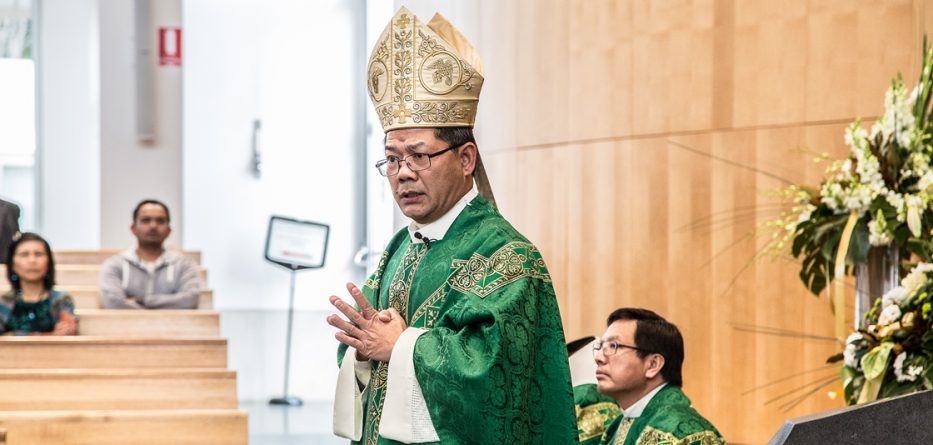Most Reverend Vincent Long Van Nguyen OFM Conv DD STL, Bishop of Parramatta
Homily for the 6th Sunday in Ordinary Time in Year C 2019 at St Michael’s Church, Parish of Baulkham Hills
Readings: Jer 17:5-8; 1Cor 15:12-20; Luke 6:17-26
16 February 2019
Seeing one another through the prism of shared humanity
Sisters and brothers,
We live in an age of anxiety, fear and suspicion, especially when it comes to strangers outside our doors and at our borders. It is uplifting, therefore, to hear of stories of compassion and solidarity that celebrate our shared humanity.
Recently, for example, a Turkish couple did something quite extraordinary. They invited not only relatives and friends but also many refugees to their wedding party. Their village was near the Syrian border and they decided to share their joy with the refugees. In fact, at one point, the newlyweds even got behind a counter and served up meals to the guests. They might not have been Christians, but what they did remind us of Jesus’ The Parable of the Wedding Feast where the poor, the crippled and the blind are invited.
Dietrich Bonhoeffer the German pastor who was imprisoned and killed by the Nazis observed: “We must learn to regard people less in light of what they do or omit to do, and more in the light of what they suffer”.
This is the prism through which the Turkish wedding couple viewed their Syrian refugees. It is the same prism that we are challenged to see our brothers and sisters – regardless of their background and status.
Commitment to the vulnerable and the marginalised is central to being a Christian. It is not optional. For the core belief of Christianity is God’s self-emptying journey to the cross for the sake of broken humanity.
This is the teaching of scriptures this Sunday. Jeremiah in the first reading puts a simple but radical choice before his people: either they put their trust in God or in themselves. It was not an easy choice for them, especially when everyone else was opting for the strongest alliance and the safest security system. With the imminent threat of invasion by the Assyrians and the ensuing chaos, the Israelites were pressured to ally themselves with the strong, the wealthy and the powerful. Jeremiah speaks the small voice of fidelity, integrity and justice in the midst of fear, self-interest and opportunism. He urges the people to stake everything on God’s covenant, rather than on human security through power and might.
The Gospel presents us with a similar if not more decisive challenge. Jesus puts to his disciples an alternative vision of life, which is polar opposite to what the dominant imperial system has to offer. His golden sermon, as it is known, begins the same way the Gospel of Luke as a whole begins, by painting a picture of a world turned upside down.
In contrast to Mathew’s Sermon on the Mount, Luke’s prism is from below. He has Jesus sit on the plain and in the midst of ordinary people. In previous episodes, we have heard that his mission was aligned with God’s compassion for the vulnerable, including the blind, the deaf, the captive and the downtrodden. He was sent to bring outsiders inside God’s circle of love. Jesus’ subversive message and style would continue to be characterised by radical embrace of the poor and equally radical challenge to the privileged.
“How happy are you who are poor; yours is the kingdom of God.” The beatitudes identify those who God has a special concern for. They are the hungry, the sorrowful and persecuted. Jesus echoes a world turned upside down that Mary sings in the Magnificat: the lowly raised and the mighty cast down, the hungry filled and the rich empty-handed. These are the people God notices and blesses.
Jesus is also clear that wealth and privilege are real dangers that have the power to separate one from God and from the human community. Jesus spells out the “woes” of which the comfortable and wealthy better beware. The kingdom of God belongs to those who have nothing except God.
Jesus teaches us that happiness does not reside in possessions, successes or achievements. Real happiness resides in a heart open to loving, to giving, to caring, to enhancing the lives of others even to the point of dying for the ones we love. Jesus invites us to find this kind of happiness through a life of witness, service and solidarity.
Dear friends,
The value system of Jesus upsets and turns upside down the value system of the world. This is evident not just through the teachings and parables of Jesus but even more so by his own life and ministry. In Jesus, we worship a God who was not content to look down upon us from some safe haven, light years away. We follow a saviour who gets down, right down on the same plain with those in the deepest pain, with those who have nothing left.
In the world in which people prioritise personal wellbeing, security and wealth over the care of the less fortunate, the Christians are called to negotiate the hard road of fraternal concern, compassion and communion.
May we follow the example of Jesus in seeing our brothers and sisters through the prism of our wounded humanity, which is healed and raised up by God’s radical outreach.








